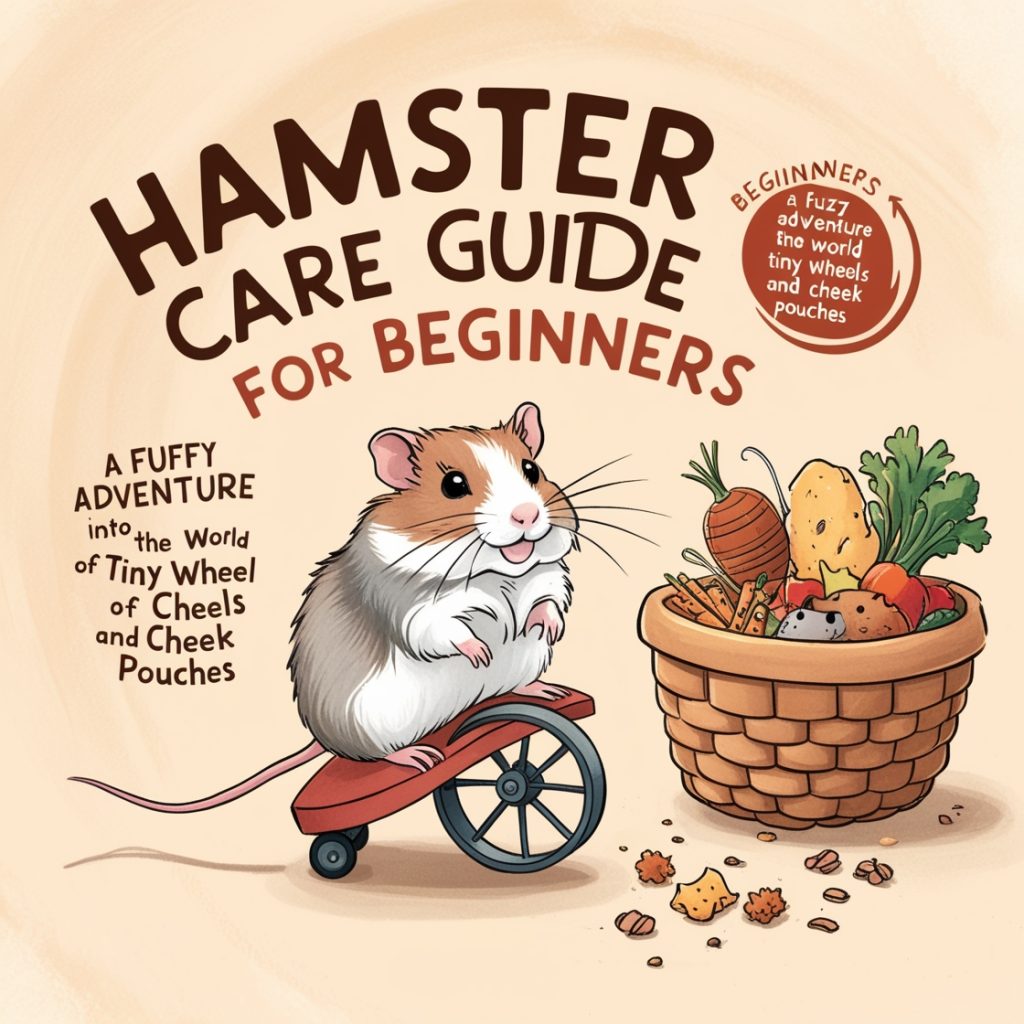
Hamster Care Guide for Beginners: A Fuzzy Adventure into the World of Tiny Wheels and Cheek Pouches
Hey there, fellow animal lover! So, you’ve decided to embark on the wild journey of hamster ownership. Buckle up, because you’re in for a ride filled with midnight wheel-spinning concerts and more sunflower seed shells than you ever thought possible. As a pet caretaker who’s seen it all (and cleaned up most of it), I’m here to guide you through the ins and outs of hamster care. Trust me, by the end of this article, you’ll be ready to welcome your new furry friend with open arms and a pocket full of treats.
Hamster Care Guide for Beginners – Why Hamsters Make Awesome Pets?
Let’s face it, hamsters are like the rock stars of the small pet world. They’re cute, compact, and have an attitude that could rival Mick Jagger’s. But before you rush out to buy one, let’s talk about why these little furballs make such great companions:
- Low maintenance: Unlike dogs, hamsters won’t guilt-trip you for not taking them on walks. Their idea of exercise is running on a wheel in their pajamas (aka fur).
- Quiet(ish): Okay, they’re not silent, but their late-night wheel marathons are way less annoying than a dog’s 3 AM barking session.
- Space-efficient: Living in a shoebox apartment? No problem! Hamsters are the ultimate minimalists.
- Entertainment value: Watching a hamster stuff its cheeks is like witnessing a magician perform the never-ending handkerchief trick, but cuter.
- Great for teaching responsibility: Kids can learn valuable life lessons without the 15-year commitment of a larger pet.
Now that we’ve established why hamsters are the bee’s knees, let’s dive into the nitty-gritty of hamster care.
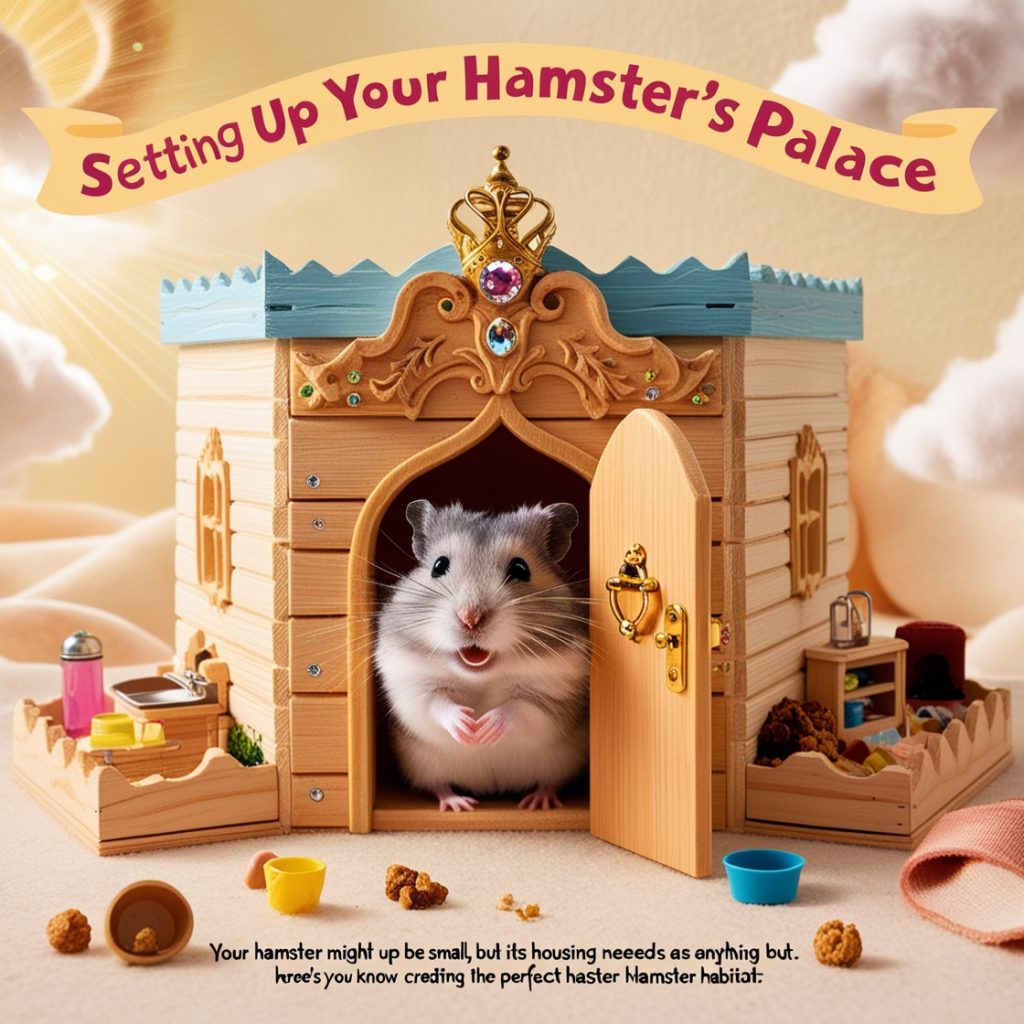
Hamster Care Guide for Beginners – Setting Up Your Hamster’s Palace

Prevue Pet Products 528 Universal Small Animal Home, Dark Gray
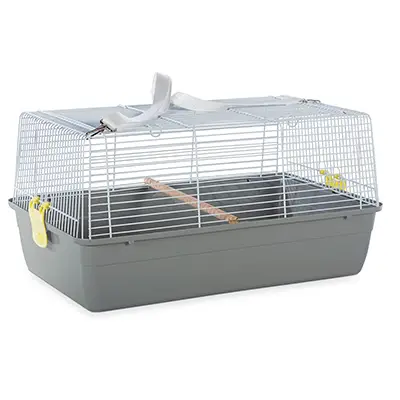
Prevue Pet Products 528 Universal Small Animal Home, Dark Gray

Ferplast Duna Space Hamster Cage
Your hamster might be small, but its housing needs are anything but. Here’s what you need to know about creating the perfect hamster habitat:
Cage Selection: Size Matters
When it comes to hamster cages, bigger is always better. Think of it this way: if you had to spend your entire life in one room, wouldn’t you want it to be as spacious as possible? Here are some cage options:
- Wire cages: Great for ventilation, but watch out for bar-chewers!
- Plastic habitats: Easy to clean, but make sure there’s enough airflow.
- Glass aquariums: Escape-proof, but can be heavy and harder to clean.
Whichever type you choose, aim for a minimum of 450 square inches of floor space. Your hamster will thank you by not turning into a furry couch potato.
Bedding: The Stuff Dreams Are Made Of
Your hamster’s bedding is like its mattress, blanket, and toilet all rolled into one. Choose wisely, my friend. Here are some good options:
- Paper-based bedding
- Aspen wood shavings
- Unscented toilet paper (for nesting material)
Avoid cedar and pine shavings, as they can be harmful to your hamster’s delicate respiratory system. And remember, when it comes to bedding depth, channel your inner lasagna chef and layer it on thick – about 2-3 inches should do the trick.
Hamster Furniture: Pimp My Cage
Now that we’ve got the basics covered, it’s time to furnish your hamster’s crib. Here’s what every stylish hamster pad needs:
- Exercise wheel: Because every hamster needs a home gym.
- Hideouts: For when your hamster needs some “me time.”
- Chew toys: To keep those ever-growing teeth in check.
- Tubes and tunnels: For secret hamster spy missions.
- Food bowl: Preferably one that’s not easy to tip over (trust me on this one).
- Water bottle: Because staying hydrated is important, even for tiny creatures.
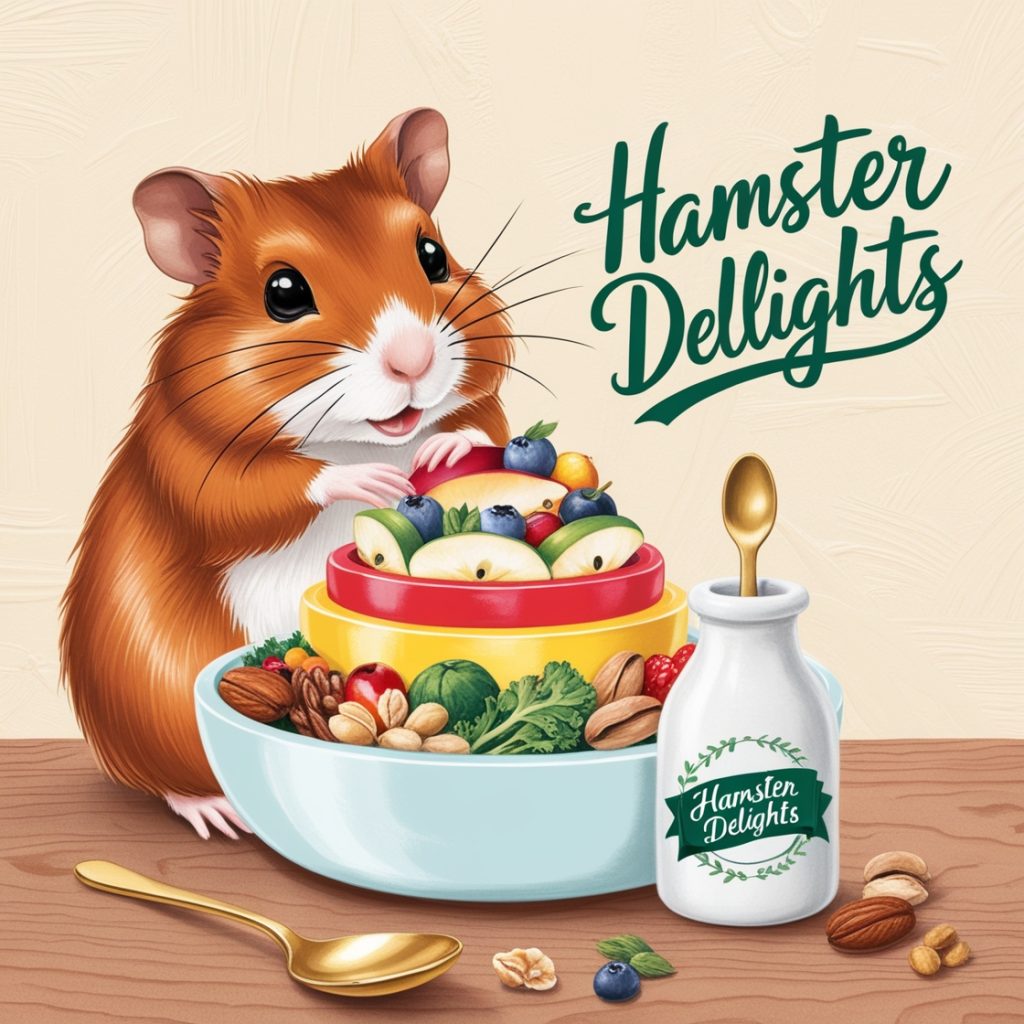
Feeding Your Furry Friend
Alright, let’s talk grub. Feeding your hamster isn’t rocket science, but there are a few things to keep in mind:
The Hamster Diet: More Than Just Sunflower Seeds
Contrary to popular belief, hamsters can’t live on sunflower seeds alone (no matter how much they try to convince you otherwise). Here’s a breakdown of a healthy hamster diet:
| Food Type | Percentage | Examples |
|---|---|---|
| Commercial hamster mix | 75-80% | Fortified pellets, seed mix |
| Fresh veggies | 15-20% | Carrots, cucumbers, leafy greens |
| Protein | 5-10% | Mealworms, hard-boiled egg (small amount) |
| Treats | Occasional | Fruit, unsalted nuts |
Remember, moderation is key. Your hamster might give you the “sad eyes” for more treats, but stay strong! Obesity in hamsters is no laughing matter (even if a chubby hamster waddling on a wheel is objectively hilarious).
Feeding Schedule: Timing Is Everything
Hamsters are nocturnal creatures, which means they’re most active when you’re trying to sleep. To keep your hamster on a healthy schedule (and to minimize midnight snack noises), try feeding them in the evening, around 7-8 PM.
Pro tip: If you want to bond with your hamster, try hand-feeding them occasionally. Just be prepared for the occasional nibble – they’re not known for their table manners.
Hamster Hygiene: Keeping It Clean
Let’s face it, hamsters aren’t exactly neat freaks. They’re more like tiny, furry college students – they’ll happily live in their own mess if you let them. But as a responsible hamster parent, it’s up to you to keep things tidy. Here’s how:
Daily Cleaning: The Quick Once-Over
Every day, take a few minutes to:
- Remove any uneaten fresh food
- Clean the water bottle and refill with fresh water
- Spot clean any particularly dirty areas of bedding
Weekly Cleaning: The Deep Clean
Once a week, channel your inner Marie Kondo and give that cage a thorough cleaning:
- Transfer your hamster to a safe, temporary home.
- Remove all bedding and accessories.
- Wash the cage with mild soap and warm water.
- Rinse thoroughly and dry completely.
- Add fresh bedding and clean accessories.
- Return your (probably indignant) hamster to its sparkling clean home.
Remember, a clean cage is a happy cage. And a happy cage means a happy hamster. And a happy hamster means… well, you get the idea.
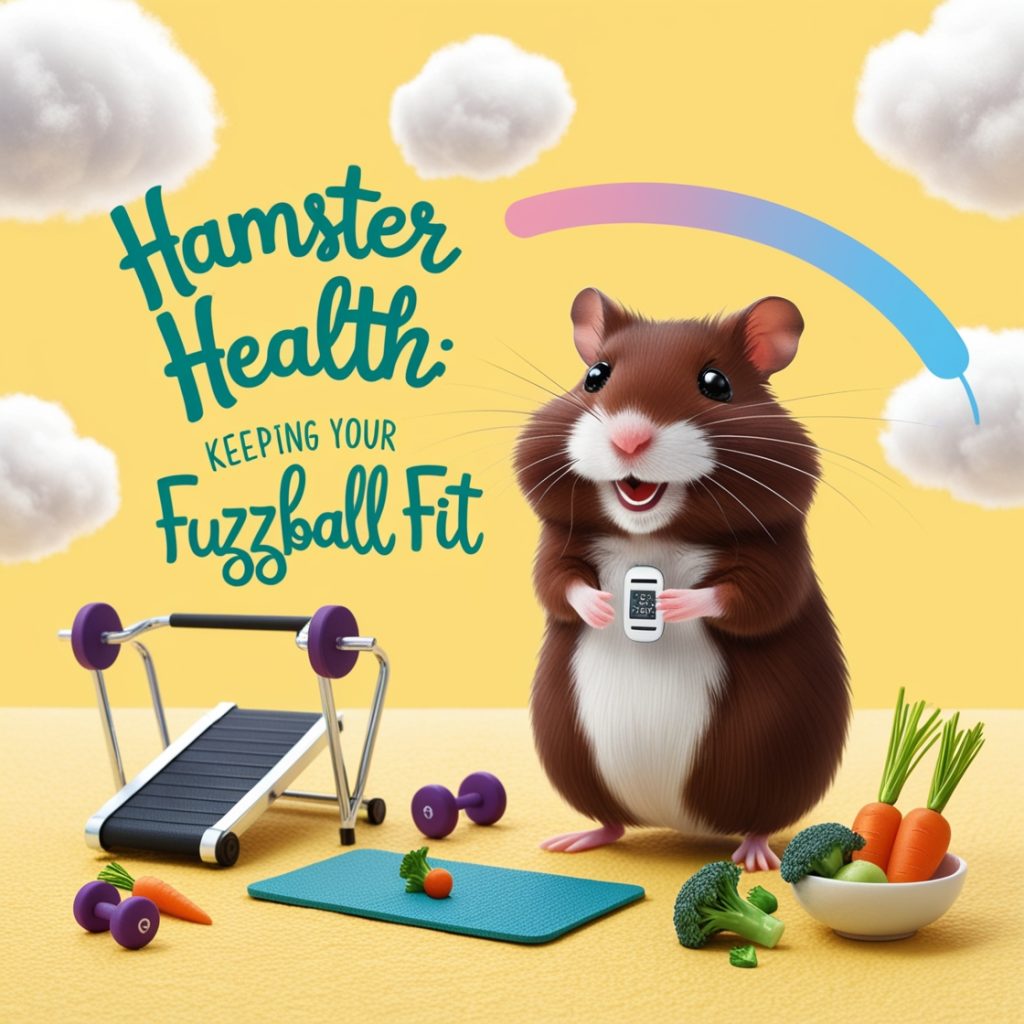
Hamster Health: Keeping Your Fuzzball Fit
Just like us humans, hamsters need regular check-ups and a watchful eye to stay healthy. Here are some tips to keep your little buddy in tip-top shape:
Regular Health Checks: Playing Doctor
Once a week, give your hamster a gentle once-over:
- Check their eyes, ears, and nose for any discharge
- Look at their teeth to make sure they’re not overgrown
- Feel for any lumps or bumps on their body
- Check their bottom for any signs of wetness or diarrhea
If you notice anything unusual, it’s best to consult with a vet who specializes in small animals. Better safe than sorry, right?
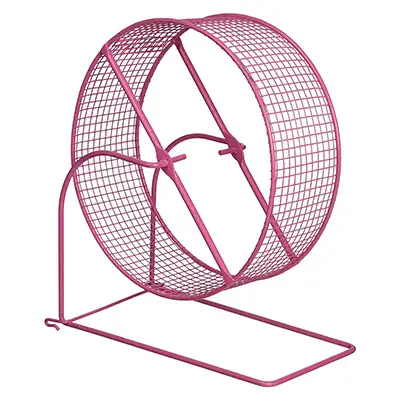
Prevue Pet Products 90013 Wire Mesh Hamster/Gerbil Wheel Toy

Prevue Pet Products 90013 Wire Mesh Hamster/Gerbil Wheel Toy

WZHSDKL Hamster Running Exercise Wheel Silent Runner Toy
Exercise: Run, Hamster, Run!
Hamsters might be small, but they’ve got energy to burn. Make sure your hamster gets plenty of exercise to stay healthy and happy:
- Provide a solid, appropriately-sized exercise wheel
- Set up a hamster playpen for supervised out-of-cage time
- Offer toys and puzzles to keep them mentally stimulated
Just remember, a tired hamster is a happy hamster. And a happy hamster is less likely to wake you up at 3 AM with its wheel-spinning antics.
Bonding With Your Hamster: Becoming BFFs
Alright, you’ve got the cage set up, you’re nailing the feeding schedule, and you’re basically a hamster hygiene guru. But how do you go from being “that giant who cleans my cage” to “my favorite human ever”? Let’s talk bonding:
The Art of Hamster Taming
Taming a hamster requires patience, persistence, and a willingness to bribe with treats. Here’s a step-by-step guide:
- Start slow: Let your hamster get used to your presence and voice.
- Offer treats: The way to a hamster’s heart is through its stomach.
- Hand-feeding: Once they’re comfortable, try offering treats from your hand.
- Gentle petting: Start with soft strokes on their back.
- Pick-up practice: Use both hands to scoop them up, supporting their whole body.
Remember, every hamster is different. Some might warm up to you in days, while others might take weeks. Don’t take it personally – they’re not rejecting you, they’re just… discerning.
Playtime: Adventures Outside the Cage
Once your hamster is comfortable with you, it’s time for some out-of-cage adventures:
- Use a secure playpen or hamster-proof a small room
- Provide toys, tunnels, and hiding spots
- Always supervise playtime (no impromptu escape attempts on your watch!)
- Limit playtime to 15-20 minutes to avoid stressing your hamster
Remember, playtime is a great opportunity for bonding, but it’s also prime time for hamster mischief. Keep a close eye on your furry friend – they’re faster than they look!
Conclusion: Your Hamster Adventure Begins
Congratulations! You’ve made it through Hamster Care 101. By now, you should feel ready to take on the exciting world of hamster ownership. Remember, caring for a hamster is more than just filling a food bowl and cleaning a cage – it’s about creating a bond with a tiny, fuzzy creature who will bring joy, laughter, and the occasional escaped sunflower seed to your life.
As you embark on this adventure, keep in mind that every hamster is unique. What works for one might not work for another, so be patient and willing to adapt. And most importantly, enjoy the journey! There’s nothing quite like the feeling of earning a hamster’s trust and affection.
So go forth, set up that cage, stock up on treats, and prepare for a life filled with wheel-spinning symphonies and pocket-sized cuddles. Your hamster adventure awaits!
FAQs: Your Burning Hamster Questions Answered
Can hamsters live together?
A: While it might seem cute to have multiple hamsters, most species (especially Syrian hamsters) are solitary creatures. It’s best to house them separately to avoid fights and stress.
How long do hamsters live?
The average lifespan of a hamster is about 2-3 years. It’s short, but hey, they pack a lot of living into those years!
My hamster is nocturnal. How can I interact with it?
Try adjusting your schedule slightly. Spend time with your hamster in the early evening when they’re starting to wake up, or early morning before you start your day.
Is it normal for my hamster to stuff its cheeks?
Absolutely! Hamsters have built-in grocery bags. They use their cheek pouches to store food for later. It’s adorable and totally normal.
Help! My hamster escaped. How do I find it?
Don’t panic! Place food and water near their cage, and set up “hamster stations” around your home with treats and hiding spots. Most escapees don’t venture far. Check small, dark spaces and be patient. Your little Houdini will turn up!
